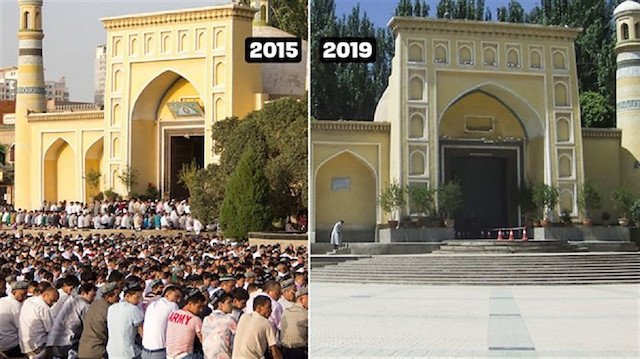
Known as China’s biggest mosque and the last to sustain its Islamic identity in recent years, the Id Kah Mosque was turned into a ghost town following years of increasing systematic restrictions
The current heartbreaking state of China’s biggest mosque in the city of Kashgar bears the brunt of China’s assimilation and oppression policies against Uyghur Muslims in Xinjiang, as shocking before-and-after photos show the gravity of the situation.
Many refer to China's Xinjiang Uyghur Autonomous Region -- home to many ethnic minorities, including the Turkic Uyghur people -- as East Turkestan.
Uyghurs, a Turkic ethnic group that make up 45 percent of the population of Xinjiang, accuse China of carrying out repressive policies that restrain their religious, commercial and cultural activities.
Known as China’s biggest mosque and the last to sustain its Islamic identity in recent years, the Id Kah Mosque was turned into a ghost town following years of increasing systematic restrictions, despite surviving centuries of Chinese occupation in the past.
Id Kah, which means a place of festivities in Mandarin, could host up to 10,000 worshipers simultaneously in the nearby Id Kah square.
However, following the latest round of restrictions against mosques in East Turkestan, not a single Uyghur Muslim can pray in Id Kah Mosque.

Starting 2016, China began to demolish mosques under the supervision of local administrations.
With the appointment of state minister Chen Quanguo in 2016, China’s campaign against mosques began in earnest, as surveillance cameras and barriers began to be installed at mosque entrances, and worshipers began to be marked, resulting in the reduction of mosque frequenters for fear of persecution as time went by.
According to Radio Free Asia, close to 5,000 mosques were closed in the city during the first three months of Chen’s term.

According to independent sources, since 1997, China has closed over 1,200 “grand” mosques across East Turkestan to worship. Additionally, hundreds of smaller mosques were also shuttered.
Some of the mosques closed by the Beijing administration were later completely demolished, others, however, were converted into communications offices for the Communist Party.
As many as 1 million people, or about 7 percent of Xinjiang’s Muslim population, have been incarcerated in a sprawling network of "political re-education" camps, according to U.S. and UN studies. Beijing says that its camps in Xinjiang are "vocational training centers.”
Last September, the New York-based Human Rights Watch released a report accusing Beijing of a "systematic campaign of human rights violations" against Uighur Muslims in Xinjiang.


